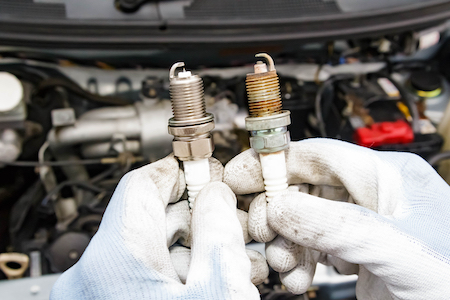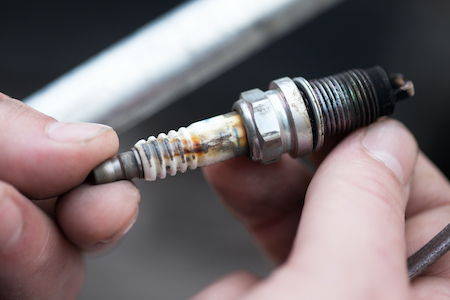One of the most powerful parts inside your vehicle are the spark plugs. They are instrumental in powering up your car. Think of them as little bolts of electricity. Without them, your vehicle simply won’t go.
If you look up the definition of spark plug in the dictionary, it states:
A device for firing the explosive mixture in an internal combustion engine
When engaged, it ignites a mixture of compressed fuel and air with an electric spark, while containing the combustion pressure within the engine compartment itself. This gives your vehicle what it needs to power up.
As you can imagine, spark plugs withstand intense heat and pressure. They are built to burn off buildups and other contaminants as it repeats this process every time you start your car.
If you have an internal combustion vehicle, your car won’t start without spark plugs in place. Their health determines how well your engine will perform as you start your car and drive. Over time, a weak or compromised spark plug can lead to a variety of problems, from issues with starting to misfiring as you drive. Without healthy spark plugs, your vehicle won’t perform well, meaning your fuel economy will be compromised.
Different types of spark plugs
While there are some models that don’t use spark plugs, most modern-day vehicles need them to produce power. Without a spark, your car won’t go. Engine performance is directly related to how healthy your spark plugs are.
Your engine needs at least one spark plug per cylinder. So, if you have a four-cylinder car, it will operate using four spark plugs.
Different vehicles need different spark plugs. They are not a “one size fits all” part. Certain spark plugs are more efficient, or perform better than others. Your car was built with certain characteristics in mind. That’s why it’s always a good idea to check with your owner’s manual before routine maintenance.
All spark plugs have a small central and side electrode to generate the necessary voltage. Overall, there are four main types of spark plugs:
- Copper
- Iridium
- Platinum
- Double platinum
Copper spark plugs use a nickel alloy electrode that is soft and not very durable. They don’t last very long, require more voltage, and are better suited for older vehicles built before 1980.
Iridium spark plugs tend to last the longest. They have a small center electrode which means it needs the least amount of voltage to produce results. If your vehicle currently uses iridium spark plugs, never downgrade to other materials as it will diminish performance. They are the most expensive of the four types of spark plugs.
Platinum spark plugs are similar to copper, except with a platinum disk in place of the nickel alloy electrode. This makes them more durable than copper spark plugs. While not the strongest on the market, they are often recommended for newer cars that use an electronic distributor ignition.
Double platinum spark plugs are reliable if your distributor ignition system is a waste spark system. This causes the spark plug to fire twice, once for the compression cylinder, the other in the exhaust cylinder. This produces more reliability in rainy or damp environments.
How spark plugs wear out
Spark plugs aren’t something that wears out quickly. You won’t be replacing them frequently, like you do an air filter during an oil change.
By the time spark plugs reach end-of-life, they’ve been through thousands of starts and stops, withstanding extreme temperatures and a wide variety of conditions. When your vehicle was designed, manufacturers installed specific spark plugs with duration in mind. When it’s time to replace your current spark plugs, sticking to the guidelines will continue durability for years to come.
Spark plugs won’t last forever. Over time, it can cause:
Deposit buildup – every time spark plugs ignite, the air-fuel mixture can leave behind trace materials. This continues to build, which can lead to pre-ignition of the fuel. If you ever find your vehicle jerking, it could be an unreliable air-fuel mixture.
Expanding gap – as a spark plug ignites, it travels over a gap of space to provide the correct level of combustion. As the spark plug ages, this gap can widen. When it’s too far apart for proper combustion, starting will be ineffective.
What will new spark plugs do for your vehicle?
Your vehicle won’t start without working spark plugs in place. When you start to notice problems with the starting process, a mechanic can inspect your vehicle and pinpoint the issue. If the spark plugs are worn, replacing them will give you:
- Better performance – fully functioning spark plugs provide better combustion. If you are having any performance issues, it may be your spark plugs.
- Better fuel economy – every time spark plugs misfire, it can impact fuel efficiency.
- Smoother starts – it’s sometimes difficult to realize just how worn down your vehicle’s spark plugs are. When you replace them and experience the instantaneous start, you can recognize just how jerky bad spark plugs can make the ignition process. Replacing them on schedule can give you a smoother ride longer.
- Lower emissions – regular tune ups and spark plug replacement can reduce the amount of emissions your vehicle releases into the environment.
When spark plugs need replacing
Like any part on your vehicle, spark plugs give off signs to warn you it’s time for replacement. You may notice:
- Rattling or knocking noises – when pistons and combustion aren’t working properly, you’ll hear it in the interaction. If the spark plug fires and the piston doesn’t move accordingly, you’ll hear rattling or knocking noises.
- Hard start – when you turn the key and your car doesn’t pop right off, you may feel jerkiness or erratic performance. Those misfires are your warning sign.
- Low performance – spark plugs continue to fire as you accelerate and change gears. If it feels sluggish throughout this process, it could be a sign of needing new spark plugs.
- Poor fuel economy – pay attention at the pump. If your gas mileage decreases, it’s a sign something is wrong with performance. Old spark plugs reduce economy as the vehicle fails to receive the right spark, meaning it works harder to produce the same results.
If you’ve noticed any of these symptoms, your first line of defense is to stop by for a full inspection. We can find the issue, and provide you with choices to prevent future problems while giving your better performance at the same time.


 If you’ve started noticing your car misfires when you turn it on, it’s just one of the signals your vehicle gives you to let you know your spark plugs are wearing out. When it comes time to replace them, there are several different variations of spark plugs available.
If you’ve started noticing your car misfires when you turn it on, it’s just one of the signals your vehicle gives you to let you know your spark plugs are wearing out. When it comes time to replace them, there are several different variations of spark plugs available. Good news! The days when drivers had to change their spark plugs every couple of years has ended. Back in the day, spark plugs really did wear out that often. Now, a couple of things are different…
Good news! The days when drivers had to change their spark plugs every couple of years has ended. Back in the day, spark plugs really did wear out that often. Now, a couple of things are different…